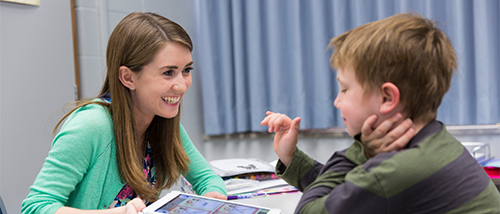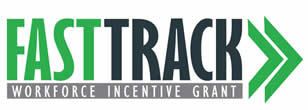Exceptional Child: Early Childhood Special Education
Continue to main content
Exceptional Child Early Childhood Degree Map
Explore the courses you'll need to complete your degree
Elementary Education Degree Outcomes & Careers
-
$69k
Elementary Teacher
According to the Bureau of Labor Statistics, the mean annual salary for an elementary school teacher is $69,790.
-
$70k
Middle School Teacher
According to the Bureau of Labor Statistics, the mean annual salary for a middle school teacher is $70,040.
-
$70k
Special Education Teacher
According to the Bureau of Labor Statistics, the mean annual salary for a special education teacher is $70,150.
As an exceptional child: early childhood special education major, you’ll learn to meet the rigor of teacher education in a supportive environment with faculty who have extensive classroom experience themselves. You’ll complete a minimum of 120 credit hours to complete this degree, including the general education requirements and at least 39 senior division hours.
Elementary Education students must be admitted to the Educator Preparation Program prior to enrolling in upper division (300 level or above) education courses.
Professional Education Requirements:
- BS118 Process Science Elementary Teachers (1)
- CE364 Methods of Teaching Math/Science/Social Studies in EC & EE (2)
- CE365 Observation/Assessment/Data Analysis in Early Childhood (3)
- CE366 Curriculum/Theory/Program Management in Early Childhood (2)
- CE368 Early Childhood Field Experience (2)
- CF124 Health/Nutrition/Safety Child (3)
- CF233 Creative Thought & Expression in Children (3)
- CF285 Learning Theory/Application: Infants & Toddlers (3)
- ED280 Introduction to Education as a Profession (3)
- ED506 Education Law and Society (3)
- EF400 Student Teaching Seminar (1)
- EL274 Diversity in American Schools (3)
- EL300 Instructional and Assistive Technology in a Universally Designed Learning Environment (3)
- EL314 Literacy Field Experience (3)
- EL316 Emergent and Early Literacy Instruction (3)
- EL317 Literacy Methods for Elementary Teachers (3)
- EL354 Meeting the Needs of Struggling Readers (3)
- EL355 Content & Disciplinary Literacy (3)
- EN140 Rhetoric & Critical Thinking (3)
- EX302 Language Development of Children with Exceptionalities (3)
- EX304 Classroom & Behavior Management (3)
- EX311 Introduction to Children with Exceptionalities (3)
- EX312 Diagnosis and Remediation of Math Difficulties (3)
- EX317 Assessment and Techniques of Teaching Children with Exceptionalities (3)
- EX373 Strategies and Techniques with a Learning Theory Base for Teaching Mild/Moderate Cross-Categorical (3)
- EX409 Advanced Field Experience in the Education of Students with Exceptionalities in Elementary Settings (3)
- EX480 Exceptional Child Education Student Teaching (12)
- EX507 Families and the Child with Exceptionalities (3)
- LI243 Children’s Literature (3)
- MA128 Numbers and Operations for Educators (4)*
- MA228 Geometry for Educators (4)
- CF120 Foundations of Child Development/PY120 Psychological Development of the Child (3)
A grade of ‘C’ or better is required in education courses. A grade of ‘B’ is required in ED280.
Additional Requirements:
Some courses may also meet General Education requirements.
- BS218 Biological Science: A Process Approach (3)
- EC101 Economic Problems and Policies (3)
- EN100 English Composition I (3)
- PH218 Physical Science: A Process Approach (3)
- PS103 U.S. Political Systems (3)
- SC105 Fundamentals of Oral Communication (3)
- UI308 Physical & Cultural Landscapes (3)
- US105 American History I (3)
NOTE: All pre-education courses are prerequisites to all Education courses.
NOTE: This program includes the course work for add-on certification in Elementary Education (1st–6th grades).
*Students who score less than 22 on the ACT math subscore must also take MA018 lab support
- 42 credit hours completed
- One of the following: 1) Composite/Superscore of 20 or higher on the ACT exam; 2) Passing scores on all sections of the Missouri General Education Assessment (MoGEA); or 3) A 4-year degree from an accredited college/university
- The following course requirements met:
- A grade of C or above in CF/PY120 The Child.
- A grade of B or above in ED280 Introduction to Education as a Profession.
- International Students must also meet the following requirements:
- C1 (CEFR) level
- IELTS minimum score of 7.0 or TOEFL minimum score of 95
- Note: This policy is for non-United States citizens who are not native English speakers. Students from the United Kingdom, Canada, Australia, and New Zealand are exempt from English proficiency verification
Some requirements may be fulfilled by coursework in major program.
- Social and Behavioral Sciences – 6 hours
- Constitution Requirement – 3 hours
- Written Communication – 6 hours
- Oral Communication – 3 hours
- Natural Sciences – 7 hours (from two disciplines, one to include a lab)
- Mathematics – 3 hours
- Humanities & Fine Arts – 9 hours (from at least two disciplines)
- Additional requirements – 5 hours (to include UI100 for native students)
- Civics examination
- GPA: 3.0 professional education
- Pass the following Missouri Content Assessments: 049 Early Childhood Special Education, 073-074 Elementary Education Multi-Content
- Complete all required course work and field experiences
Early – explore the role of educators before you commit to the degree
Mid-level – exceptional child: early childhood special education majors do field experiences with infants/toddlers, preschoolers, kindergarteners, and elementary aged students; field experiences are connected to education coursework.
Student Teaching – semester long, co-teaching capstone experience in an early childhood classroom (PreK-3rd grade).
First Year
Fall Semester (12 Hours)
- UI100 (1)
- EN100 (3)
- BS118 (1)
- MA128 (4)
- SC105 (3)
Spring Semester (15 Hours)
- BS218 (3)
- ED280 (3)
- EN140 (3)
- PY/CF120 (3)
- US105 (3)
Second Year
Fall Semester (16 Hours)
- EC101 (3)
- EL274 (3)
- MA228 (4)
- PH218 (3)
- PS103 (3)
Spring Semester (18 Hours)
- CF124 (3)
- CF233 (3)
- CF285 (3)
- EX311 (3)
- LI243 (3)
- UI308 (3)
Milestone: Maintain 3.0 GPA in content courses; Passing score MoGEA or ACT
Third Year
Fall Semester (18 Hours)
Literacy Block
- EL300 (3)
- EL314 (3)
- EL316 (3)
- EL317 (3)
- EX302 (3)
- EX304 (3)
Spring Semester (18 Hours)
Content Block
- CE364 (2)
- CE365 (3)
- CE366 (2)
- CE368 (2)
- EX312 (3)
- EX317 (3)
- EX373 (3)
Milestone: Maintain 3.0 GPA in content courses and 3.0 GPA in education courses
Fourth Year
Fall Semester (15 Hours)
Advanced Block
- ED506 (3)
- EL354 (3)
- EL355 (3)
- EX409 (3)
- EX507 (3)
Spring Semester (13 Hours)
Student Teaching Block
- EF400 (1)
- EL480 (12)
Milestone: Passing score MO Content Exams and MEES; 3.0 GPA in content courses
What will it cost?
Get Funding for Your Education
Missouri’s opened the door to a more educated workforce. We want to help you walk through it. If you’re an adult learner and a Missouri resident returning to college, learn about the Fast Track Workforce Incentive Grant. It’s a statewide financial aid program that can be used to pursue a certificate, degree or industry-recognized credential in a high need area in Missouri. This major is eligible for the Fast Track grant.
Become a Redhawk.
Do more than dream about the future. Take the first steps to make it all happen.
Technology in the Classroom
Southeast has started an EDvolution®. It’s our tech-ready promise to prepare majors to use and integrate instructional technology in the classroom, so students can do so seamlessly in their classrooms as beginning teachers. All students in Educator Preparation Programs must have a device, i.e. laptop, or iPad, for use during the program.
- Tech for You: become a better student with technology
- Tech for Us: learn how to teach with technology
- Tech for Them: use technology in your field experiences
Tomorrow’s Teachers Learning Community
As an elementary, early, and special education major, you can choose to participate in Tomorrow’s Teachers Learning Community. This is Special Interest Housing comprised of groups of students with a shared academic interest either on the same floor or within the same residence hall. These communities provide students an opportunity to challenge and shape their personal and professional identities. They build community with programming designed by faculty and staff from their academic area and Residence Life staff. It gives you the opportunity to know, support, and collaborate with others to help in your academic and personal success.
Cape Girardeau, MO 63701


